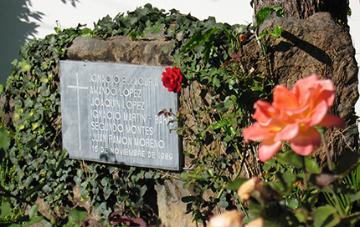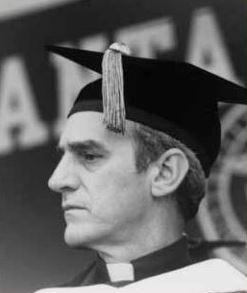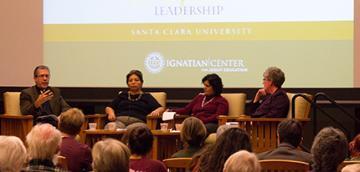Truth in the Service of Justice
Excerpts from La Verdad: Witness to the Salvadoran Martyrs
By Lucía Cerna and Mary Jo Ignoffo '78
co-authors ofLa Verdad: Witness to the Salvadoran Martyrs
In commemoration of the 25th anniversary of the assassination of the Jesuits and their collaborators at the Universidad de Centroamericana (UCA) in El Salvador, Santa Clara University co-published with Orbis Press, La Verdad: Witness to the Salvadoran Martyrs. La Verdad is the firsthand account of the martyrdoms of the Jesuits and their collaborators by Lucía Cerna, a Salvadoran woman who served as a housekeeper at the UCA.
Cerna’s account of the martyrdoms and her own life story is accompanied by a reading of El Salvador’s history and the intersections of El Salvador and United States politics by local scholar and SCU alumna, Mary Jo Ignoffo. La Verdad: Witness to the Salvadoran Martyrs was Santa Clara University’s common reading book for all first-year undergraduate students in this 25th anniversary year of the UCA martyrs.
My Blood Went Cold
I woke in the night, hearing a tremendous uproar inside the Fathers’ home. I heard shooting, shooting at lamps, and walls, and windows. I heard doors kicked, and things being thrown and broken in the living room. I thought the war must be inside the campus. How could that be? I wondered. We saw soldiers earlier, so how could guerrillas get inside? The soldiers must be drunk, I thought. They were shouting bad words. I went to see what happened.

I got up to stop them. I want to say, “Why do you do this to the priests’ home?” Jorge said no. Until that moment I did not think that they might kill me too. I would be dead now if Jorge did not say, “Don’t go!” My God, I realized, they would kill us too. Shooting and shooting, I needed to stay and not move. There was only one wooden door between us and them. All they had to do was kick the door down and they could come to shoot us. We had no protection, but they believed nobody was there. That was our safety
Padre Nacho was yelling—really, really, yelling —on the path behind the house where we were. The shooting did not stop. It was serious. My blood went cold, like ice. I wished to go to stop the situation. I felt I had no hands, no arms, no power. I could do nothing to help Nachito, and he was yelling. My blood turned to ice, from the top of my head all the way down to my toes, and back up again. Then Padre Nacho yelled they are all carroña [scum] and “this is an injustice!” Now I wonder if he was yelling carroña and injustice because he knew I was in that room and he knows me. He knew I would hear, and I would tell. I would not let anything stop me from telling. After his words there was only quiet, very deep quiet. Then a huge bomb exploded and the garage and cars were destroyed. The house where we were shook with the bomb. Jorge put his hand on Geraldina [our daughter], patting her back so she would not cry. He wanted to keep her silent. If they knew only a door separated us from the campus, they would have killed us too. In the quiet we went to look out the window again. There were soldiers there, with camouflage uniforms, and visors on their caps. I was afraid. How are the Fathers? I think I knew.
What Are You Living For?
What Would You Die For?

When Ignacio Martín-Baró, S.J.—Padre Nacho—snapped a photograph of Lucía Cerna as she cleaned his office at the UCA (University of Central America José Simeon Cañas) in the spring of 1988, he captured an image of her at her happiest. She loved her job as a housekeeper at the UCA because she felt respected and trusted, for her a rare and new experience. At that moment in 1988, as civil war shattered El Salvador, she knew a little peace. Against all odds she owned a home, her husband had established a small business, and the two had a healthy baby daughter. Lucía recalls, “I wish I could explain how happy we were!”
The happy photo of Lucía sounds a disturbing alarm though. A small sign propped against Nacho’s many books reads Tortura Nunca Mas (no more torture). Civil war raged barely outside the campus walls, and in fact, bombs had been detonated at University buildings on at least fourteen occasions between 1977 and 1986. Lucía’s employers, the Spanish Jesuit priests who worked as university administrators, persistently lobbied for better living and working conditions for the majority of Salvadorans.

El Salvador, among the smallest Central American nations, has simmered in class struggle throughout most of its history. The fundamental conflict from the late 19th through the 20th century lay in the fact that a relative few own most of the land— planted for coffee and sugar exports. For generations, almost-starving Salvadorans worked the land to fill the pockets of the growers. Full-out war erupted on the occasions when the poor protested and took up arms, most notably in La Matanza (the slaughter), an insurrection in 1932 to which the government responded by slaughtering an estimated thirty thousand people, and during the civil war the 1980s, when the civilian death toll at the hands of the military rose higher than seventy thousand.
The president of the UCA during the latter conflict, Ignacio Ellacuría, S.J., placed himself squarely in the middle of the country’s conflict by speaking to both the political right—the government—and the left—guerrillas seeking an overthrow of that government. He was labeled a communist because he called for the military to halt atrocities in the countryside and was highly critical of the billions of U.S. dollars supporting the brutal military regime. Between 1977 and his death in 1989, Ignacio Ellacuría suffered death threats, had been expelled from the country, was forced into hiding, and heard bounties for his head announced over Salvadoran radio. He was specifically targeted for elimination.
Ellacuría and others at the UCA followed the mission of the University: to act as an intellectual conscience for the nation. He often reiterated the need to speak for the oppressed. “Our university’s work is oriented,” he said, “on behalf of a people who, oppressed by structural injustices, struggle for their self-determination—people often without liberty or human rights.” The commitment to speak out in favor of the majority of the people placed some of the Jesuits at the UCA in a corrosive political environment that ended up costing their lives.
What then does a university do, immersed in this reality? Transform it? Yes. Do everything possible so that liberty is victorious over oppression, justice over injustice, love over hate? Yes. Without this overall commitment, we would not be a university, and even less so would we be a Catholic university.
—Ignacio Ellacuría, S.J., 1982 commencement address delivered at Santa Clara University seven years before his death
Lucía Cerna is a native of El Salvador and during the 1980s worked as a housekeeper in the administration offices of the Jesuits at the Universidad de Centroamericana (UCA), San Salvador. When a battle of that country’s civil war made it too dangerous to remain in her home, she and her family sought refuge from the Jesuits of the UCA. On the same night she arrived at the campus in 1989, six of the Jesuits and two women were shot by Salvadoran military personnel. Cerna was the only witness willing to come forward to report what she had seen. As a result of her testimony, she had to leave El Salvador, and upon entering the US, was detained and interrogated by the US State Department and the FBI. Her witness and the subsequent interrogation are reported in La Verdad. In the U.S., she and her husband raised their daughter, and she earned certification as a nursing assistant, eventually rising to a training position. Cerna retired after 20 years in the healthcare field.

Mary Jo Ignoffo teaches history at De Anza College in Cupertino, California, specializing in modern U.S., California, and local history. She has authored six books, and her Gold Rush Politics was the California State Senate’s commemorative book in honor of California’s Sesquicentennial. La Verdad, her latest book, is based on oral history interviews with her friend and co-author Lucía Cerna, the only witness to come forward to the 1989 murders of six Jesuit priests and two women on the campus of Universidad de Centroamericana, San Salvador. Ignoffo received her B.A. in Religious Studies from Santa Clara University and her M.A. in U.S. History from San Jose State University.
Endnotes
- Lucía Cerna and Mary Jo Ignoffo, “La Verdad: Witnessing Truth in the Service of Justice,” panel dialogue, 2014–2015 Bannan Institute: Ignatian Leadership series, November12, 2014, Santa Clara University. A video of the full dialogue is available online at: scu.edu/ic/publications/videos.cfm.
- Excerpt authored by Lucía Cerna from Lucía Cerna and Mary Jo Ignoffo, La Verdad: Witness to the Salvadoran Martyrs (Maryknoll, NY: Orbis Books, 2014), 83-84. Reprinted with permission.
- Excerpt authored by Mary Jo Ignoffo, from Lucía Cerna and Mary Jo Ignoffo, La Verdad: Witness to the Salvadoran Martyrs (Maryknoll, NY: Orbis Books, 2014), xvii-xviii. Reprinted with permission.
- Ignacio Ellacuría, S.J. commencement address, Santa Clara University, 1982, Archives and Special Collections, Santa Clara University, Santa Clara, California.

